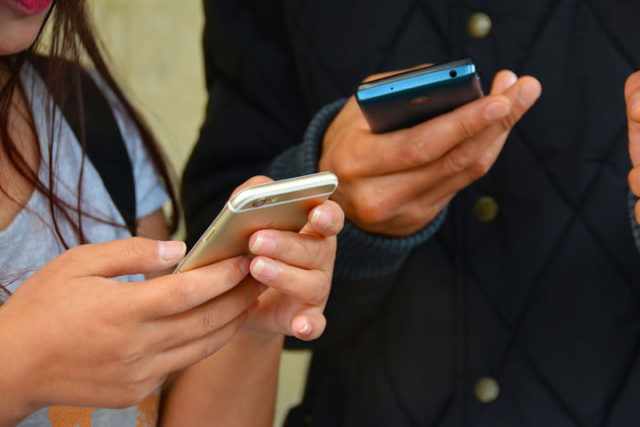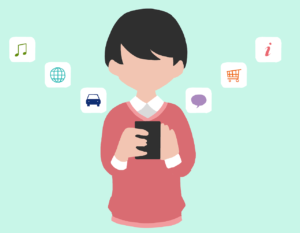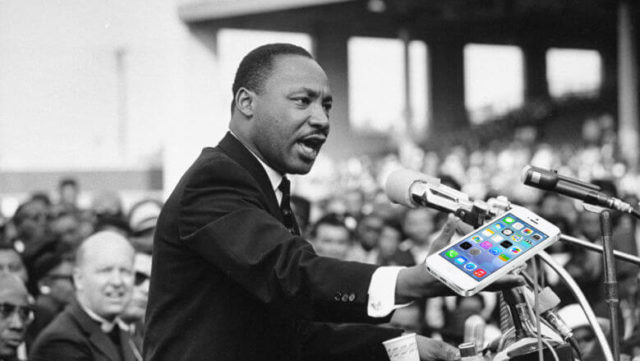'Diffusion' of attention by gadgets as a diagnosis of modern society.

Sometimes I go to a gym near my home for army recruit camp-style training. During this workout, the coach stands and yells at you, forcing you to do more push-ups and squats until exhaustion and nausea. After that, you go home and for three days you cannot relieve your natural needs. Training is just class. I adore her. I go every week. Today, as often happens on any other day, several people in between exercises ran to the wall to pick up the phone and check … I don't even know what they were checking there. E-mail? Instagram? Broadcast your Snapchat sweat droplets for everyone to see? I do not know. The bottom line is, they were immersed in phones. And the coach got angry, yelled at them to put their damn phones away and everyone else stood around awkwardly. This was repeated 2-3 times per lesson, this happens almost at every workout and for some reason I once decided during a general training to express my position to a woman who fell on the phone: 'Can't this wait 30 minutes? Or are you treating cancer there or what? ' Note to readers: this is not how you make friends.
I was angry. But don't give a damn about them. I felt the truth behind me, I expressed what everyone else in the audience was thinking to themselves. Later that afternoon, after we had all gone home, I replayed the incident in my head. And I asked myself: 'Why did this hurt me so? Why are phones so annoying in most cases? Why does it piss me off when my wife pulls out her phone during our walk together? Why do I wholeheartedly hate people who hold their phones over their heads and record half a concert? What's the matter?' Is there something wrong with me alone? Although I'm fine, I know it. Today we all have a difficult relationship with our phones. Every year we 'stick' to them more and more. Yet every year we see growing dissatisfaction about this. Why is this happening?
Attention pollution

If you think about it, our attention is the only thing we really possess in our life. Our property may disappear. Our bodies are always under threat. Relationships may fall apart. Even memories and intellectual abilities fade over time. But we always have a simple opportunity to choose what we want to focus on. Unfortunately, due to advances in technology, our attention is 'scattered' and divided into comparatively more distractions, making it harder to concentrate and at the same time making it more important than ever. In his book 'Deep Work', Cal Newport discusses that the ability to fully immerse yourself in one project, idea or task for a long time is one of the most important skills for those wishing to succeed in the information age, but it is increasingly rare.
But I will go even further. I believe that our ability to focus and pay attention only to important tasks is integral to a happy and healthy life. We all experienced days or weeks (months, years) of scattered and uncontrolled existence in our reality, constantly being dragged into the turmoil of useless information and experiences, consisting of endless clicks and notifications. In order to be happy and healthy, we need to feel that we are in control and that we are using our abilities and talents effectively. To do this, we need to control the ability to concentrate. I think that this is the reason for my failure on the smartphone in the hall. The workouts are damn hard. They require me to focus and make not only physical but also psychological efforts. I am knocked out of this rut by someone having to write to my boss or boyfriend every 10 minutes. Worse, it happens against my will.

Diffusion of attention is when someone's inability to concentrate and control themselves affects the attention and concentration of others. And in connection with the boom of 'smart' devices and the widespread availability of the Internet, this phenomenon, without our knowledge, is increasingly being introduced into our lives. It (the phenomenon) manifests itself when we get angry at the phone we got in the cinema. It is noticeable when we are annoyed by a person checking mail while watching a game. Their inability to concentrate negatively affects our already fragile concentration. Just as secondhand smoke damages everyone around the smoker, smartphones prevent people from focusing around the user. It 'captures' our senses. He forces us to interrupt the conversation and re-express thoughts unnecessarily. Because of it, we lose the thread of the narrative and forget an important argument to which we mentally summed up the dialogue. It undermines our ability to communicate and simply be in private, simultaneously destroying the intimacy and closeness of communication.
But the smoking analogy doesn't end there. There is evidence that we do long-term damage to our memory and attention span. Long-term smoking causes irreparable harm to our health in the name of fleeting euphoric outbreaks, and the rush of dopamine from our phones harms our brain's ability to work for extended periods of time for a bunch of likes under the newest really cool photo of our food.
It might sound like I'm going overboard. Let's say I had a bad training and I take my indignation to the judgment of hundreds of thousands of readers on the net. But I am absolutely serious. The trend spoils us more than we can imagine. I noticed that over the years it becomes more difficult for me to sit down and write such an article, 3-4 years ago it was easier. And it's not just the number of distractions that have accumulated over the years. The fact is that my ability to withstand these factors has weakened to the point where I cannot control my attention on my own. And that scares me. It’s not that I hated that woman in the audience who couldn’t survive for 10 minutes without checking messages. I despise the fact that I am becoming that person. I'm sure I'm not alone.
Over the past few years, I've met people who are incredibly anxious if they can't get their phone out in a social situation. They bring telephones into dialogue, the way some people carry dogs onto airplanes. And this turns into a kind of way out when there is an irresistible need to interact with someone's thoughts and feelings.
I began to notice that people who constantly need to check their mail or messages begin to feel like good productive employees. And it doesn't matter what happens, be it a child playing a violin, stopping a car at a traffic light, or just bedtime at midnight on Saturday. They feel the need to be aware of all the information available to them, otherwise they feel like they are on the losing side in one way or another.
I've noticed friends who can't sit through an entire movie (and sometimes a series of TV shows) without reaching for their phone multiple times. And people who cannot eat peacefully without putting their phone next to their plate. This is happening everywhere and in this regard, it turns into a social norm. Disturbed attention becomes a normal socially approved behavior and we all pay a price for it.
Future

Friends, I have a dream. I dream of a world in which people can communicate for a long time and tediously without having to plunge into the world of instant gratification through shining plastic screens. I dream of a world where people understand the value of not only their own attention, but also the attention of others and realize that not quite smart people who start a correspondence in the cinema really spoil the impression of a dramatic scene.
I have a dream of a time when our devices will be assigned the convenient role of additions to life, rather than a pathetic attempt to replace it. The time when people will understand that the constant and continuous process of delivering information does not go unnoticed, leaving behind both obvious advantages and hidden costs.
In my dream, a world where people consider their attention to be an important resource that needs to be developed and renewed, appreciated and built, by analogy with how they take care of their body or education. Strangely, the new trend in attention work will set them free. Not only from screens, but also from their own subconscious impulses.
I dream of a world where respect for attention spreads to the world around, to family and friends, and also comes to understand that the inability to concentrate is harmful not only for a person, but also for his relationship and ability to stay close to someone. I dream that women will not check their unfortunate phones when I do my three hundred and twenty-seventh repetition of the exercise. I beg you, this is just a gym.
And when all this happens and we enjoy freedom, when we extend it to every village and every village, every state and every city, then only then can we proclaim all people, regardless of religion, finally free of smartphones. Yes, I plagiarized this paragraph, but next time you think of pulling your phone out for yourself at dinner, think about what Martin Luther King would do.
Original material by Mark Manson
An absolutely wonderful article, the author sharply and aggressively attacks modern trends and exposes behavioral trends, at times it even becomes ashamed of himself and his friends, because our interaction with gadgets fits perfectly into the scenarios described by the author. However, I still do not see a possible way out of this situation for myself, the fact that my scenario of communicating with social networks and the Internet space is not typical for most users, so there is hope.
The Besedka has already raised the topic of the influence of technology on our thinking. Sadly, the influence is palpable, many people are more accustomed to jumping from one messenger to another, then to social networks, then to the mail and in a circle, without giving an account and not caring about what is happening around and how their actions will affect the emotions of the interlocutors. Unfortunately, the social aspect of dialogues is moving to the network, the process cannot be stopped. Hopefully, only working conversations and insignificant social interactions will remain there. Otherwise, society will have a hard time.
